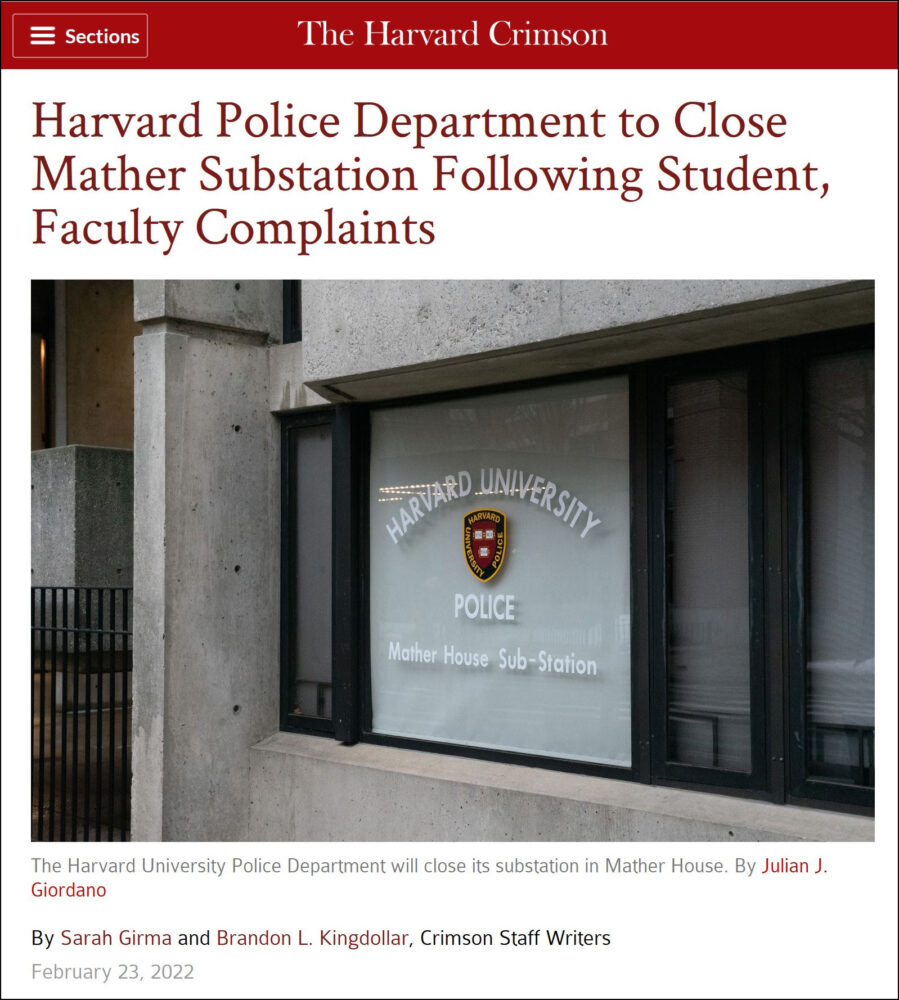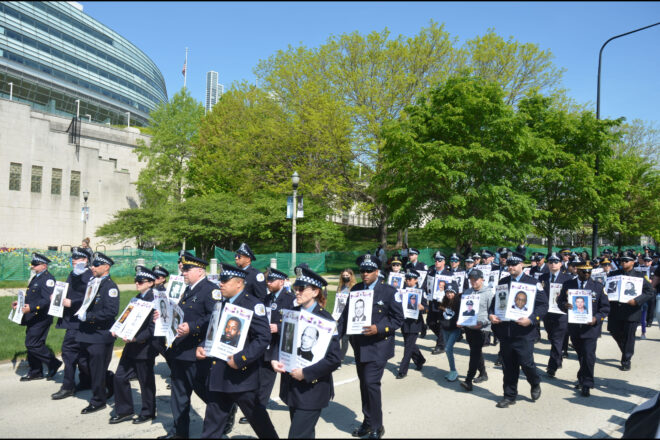Harvard University is often hailed as the standard in American higher education. It has been an institution of higher learning longer than the United States of America has been an independent nation. Indeed, founded in Massachusetts in 1636, Harvard College was the first such place of learning in the thirteen colonies. Eight future U.S. presidents gained degrees from Harvard. To borrow a phrase, one might say that Harvard has long been a “place of privilege.” Harvard’s Cambridge-area campuses are patrolled by the university’s own police department, and the university is a well-protected, low-crime community. Yet, as in many urban areas, the local police-community relationship at Harvard is far from ideal.
In February 2022, the Harvard Crimson, the university’s student newspaper, reported on the announced closure of the university police substation at Mather House. The closure was in response to student and faculty complaints about the on-site visible police presence. Mather is a 19-story residential building for undergraduate students. According to Wikipedia, Mather House historically had a “partying” reputation, and it is currently known for “its social life and a spacious, newly remodeled dining hall with a view of the Charles River.” As reported by the Crimson, the Mather faculty deans expressed “student concerns” about how the university’s armed police officers “regularly ate in the dining hall alongside students.” Exercising their privilege of defining who has access, since the Fall of 2021, the university has barred its officers from eating in student dining halls. Secure 1776 does not find this action to be a particularly positive model for police-community relations.
Estimated reading time: 9 minutes
Police Not Really Welcome
Mather House opened in 1970. For decades, the Mather House Committee (HoCo), an official university residence body, has been known for its focus on the social aspects of college life. Beyond the biweekly happy hours, among the events highlighted by the Crimson in March 2021, was Mather’s annual foam party. In 2003, the “Mather Lather” was identified by the then Mather HoCo chair as an attempt to “re-establish the dominance of Mather as a party house.”

At the time of its closing, the Mather substation was one of four such facilities operated by the Harvard University Police Department (HUPD). Eleanor Taylor, a Mather resident from the Class of 2022, described the substation to the Crimson as “a violent, visual intimidation tactic that students (were) forced to see every time they enter(ed) the house.”
However, the “violent” assertion was provided without any mention of any actual physical encounters between students and police officers at the substation. Taylor is an international student from the United Kingdom, and in the coming weeks she will be receiving a Bachelor’s Degree in Education. While some have called for the HUPD to be “abolished,” the Crimson did not provide any data on how widely Taylor’s views of the substation were held among others at Harvard.
It Was Different Before
The sentiments about HUPD substations expressed in 1996 by Sarah Jacoby, another Harvard student from the Class of 1999, were quite different from those described in 2022 by Taylor. Jaoby had also been a Mather resident, and she authored a November 1996 Crimson perspective entitled, “Why I Should Feel Safe To Walk Alone.” In the piece, Jacoby expressed her concerns about student safety, particularly for women, walking at night in the more isolated areas of Harvard. She wrote:
“Why have I become so fearful? Why do I sigh with relief as I enter the gates to my house? Where has ‘woman, hear me roar’ gone? Perhaps it’s the onslaught of muggings, attacks and rapes that have occurred in the last year. She added: “There is a new police substation in Weld, open 24 hours a day. (HUPD) Chief (Francis) Riley has said that he is working to create additional substations in the River and Quad houses. So I propose a Mather substation.”
Breaking Bread
According to then HUPD Chief Riley, the Weld substation was established in February 1996 to “give students and potential intruders a sense of an increased police presence in the Yard” (a large tree-lined space at the center of the main Harvard campus). With the opening of the Weld substation, then Dean of Freshmen Elizabeth Studley Nathan advised the Crimson: “Neither Chief Riley nor our staff confuses police presence and visibility with inappropriate intrusion into students’ lives or privacy.” Chief Riley expressed his hope that the students would be welcoming of the substations so that the officers could “become more of the community.”
In seeking to further build stronger police-community relations, then Chief Riley reported that he had also negotiated a “program with Harvard Dining Services to allow officers to eat in house dining halls at reduced rates.” Under the program, HUPD encouraged its officers to eat (that is “break bread”) with the students on campus.
The Significance
To “break bread” with someone means to share a meal. The history of “breaking bread,” as an expression of, as well as a deliberate effort to build, a sense of community, extends back to ancient times. Bread has long been a central meal item. To share a loaf of bread with others, it must be broken apart. Hence the phrase. The Christian Bible contains 21 specific references to breaking bread, including the breaking of bread by Jesus with his followers.
Does Harvard Have the Courage to Seek Truth?
Secure 1776 has spent a couple days searching the online archives of the Crimson, as well as reviewing the HUPD’s 2021 Annual Report and police department overview. The university police department at Harvard is comprised of approximately 85 sworn officers and 25 civilian employees. The campus also has a contingent of non-sworn security officers. HUPD’s sworn officers are designated as special Massachusetts State Police officers, and they have the power of arrest on campus and on city streets in Cambrige, Somerville, and Boston. Harvard’s police officers have the authority to enforce state and local law, as well as the university’s policies.
There have been criticisms of the police at Harvard, including an extended January 2020 article, which covered internal department issues and allegations of an “old boys network” under the long tenure of now-former Chief Riley. Nationally, in the wake of of the George Floyd incident, and the rise of what Thomas Lemmer has described as demands for a “tragedy-free policing, or else” standard, it was not surprising that activists at America’s universities made loud demands to eliminate campus police agencies. The police-community relationship at Harvard was impacted by this activism, even as others cautioned against “knee-jerk reactions” to defund campus police departments.
A Safe Place
But, from an outsider’s perspective, even as Harvard is located in the heart of the largest urban area in Massachusetts, it remains a low-crime community. All reasonable assessments of campus safety would give Harvard’s police at least some credit for that reality. Simultaneously, as is generally the case with college police agencies, in truth arrests on Harvard’s campuses are infrequent. Without question, in the “guardian or warrior” discussion within policing, campus police officers, including those at Harvard, trend heavily toward the guardian role.
Clinical psychologist Jordan Peterson has for decades engaged in the study of evil, with a particular focus on the totalitarian regimes of the 20th Century. In the lecture clip below, Peterson begins with a discussion about truth. He describes the necessity for truth, and the simultaneous discomfort – even pain – that the acceptance of truth can cause. For some, political agendas can come with an intense desire to win the argument, even when the means of winning are not based in truth. The horrific atrocities of totalitarian regimes necessitate the complicity of individuals to commit acts of evil. Peterson cautions that each individual must recognize their own potential to engage in evil, and that the prevention of societal atrocities fundamentally relies on individuals to resist the social forces that facilitate the prevalence and escalation of evil.
The Importance of the Community of Us
Whenever the police are viewed by the community as being separate and apart from the community, the police will fail in their public safety efforts, disorder and violence will increase, and an increased frequency of incidents viewed as abuses of authority are inevitable. To maintain the support necessary for our police officers to meet their mission, the voices of support for the police must be heard from across the community of us.
When a group is declared to be unworthy to even eat in the same room with others, an explicit statement about the lack of fellowship and community is being made. History has shown us that acts of evil against any group are always more likely once that group has been demonized — that is separated from the “community of us.” Can it be true that deliberately excluding police officers from eating in the same place as Harvard students is good? Does it truly serve the interests of the community? Does such a deliberate exclusion strengthen the police-community relationship at the university. Or is the deliberate exclusion of HUPD officers from Harvard’s student dining areas far more an expression of a political agenda willing to demonize the university’s police officers?
A Place for Common Needs
The documentary film “Breaking Bread,” provides an example of the power of a meal – the sharing of food – to do good. The film highlights the efforts of Dr. Nof Atamna-Ismaeel, the first Muslim Arab to win Israel’s Master Chef competition. Dr. Atamna-Ismaeel has taken that experience and created the A-Sham Arabic Food Festival. By pairing Arab and Jewish chefs, the act of sharing food provides very personal opportunities to bridge the divides between people. Here is another “cops ask questions” question: Might Harvard have something to learn from this example?
Whatever other failings that Chief Riley may have had, he was correct to encourage his officers to be among the university’s students. Such is essential to strengthening their bonds to and with the Harvard community. Excluding the police from Harvard’s student dining areas is foolish, and the lesson provided is not a positive one relative to strengthening police-community relations on campus.
Without question, constructive dialogue and a sense of community can be strengthened in the act of sharing a meal. Harvard would be wise to encourage the university community to actually seek opportunities to break bread with their officers. Pass and share the bread.
We are interested in your thoughts, and invite you to comment below.



This is another case of an administration bowing to the demands of the vocal minority. While a small group of anti police radicals want the police defunded and removed from the campus, the silent majority would suffer. Fewer officers always means emboldened criminals and more crime. I’m not sure who would protect these students from the predators who lurk just outside of the gates, but sure seems to be some stupid people at Harvard.
Fundamentally, the administration of the university has a responsibility to the entire university community to advance critical thinking and policies that strengthen the learning environment. They have failed their students with their exclusionary policy. Worse, they have participated in an act of demonization of their own police officers. As a leading institution of higher learning, far better is the reasonable expectation.
Ha… This has been going on for decades at our esteemed private universities and colleges. I worked part-time for the University of Chicago campus police in the 1980s and 1990s. The university administration always considered the faculty and students a “better class” of individuals over campus police/ security. That is fine, we are their employees. Students were a very “protected class” of individuals. They most certainly were (and currently are) considered a new category of citizen… they are the recipients of “Private University Privilege”. Yes, they are “PUPs”. I can provide multiple examples of this, and here are two. As UofC Campus Police Officers we were cautioned to always call the UofC “Duty Dean” before we notified the Chicago Police Department (CPD) that a student was being held for a criminal offense. If the student was accused of minor offenses (Criminal Damage to Property, Theft, Some Drug Offenses, Assaults, etc), the “Duty Dean” would resolved the situation without the CPD being notified and without a UofC Police report ever being generated. “Privilege”. The UofC provided a safety escort service for anyone living in the boundaries of the UofC campus. The service was called “umbrella coverage”. The UofC Campus Police would follow the requestor in their squad car from a distance and provide an area of safety. Dispatchers were instructed to take the requests for this service from students and faculty first, rather than providing it for Hyde Park residents… that make sense. What did not make sense is that students and faculty would regularly make complaints against UofC Campus Police Officers for; following too closely, following too far away, not following traffic laws, and not providing rides. The UofC Police Department would take these complaints and discipline officers regularly. “Privilege” The “PUPs” are running and ruining the world!
“PUPs” – awesome.